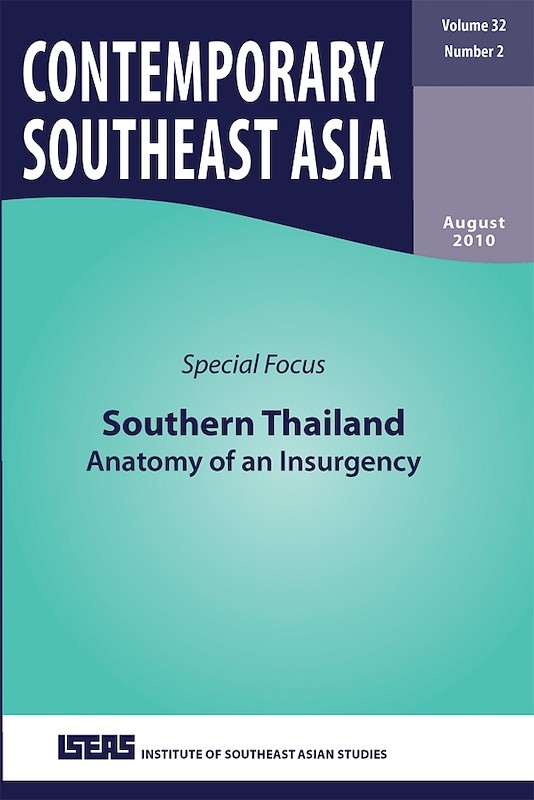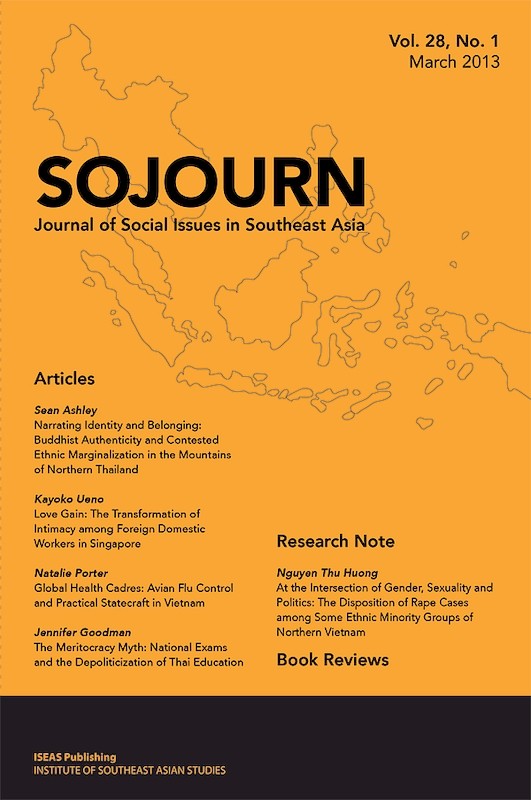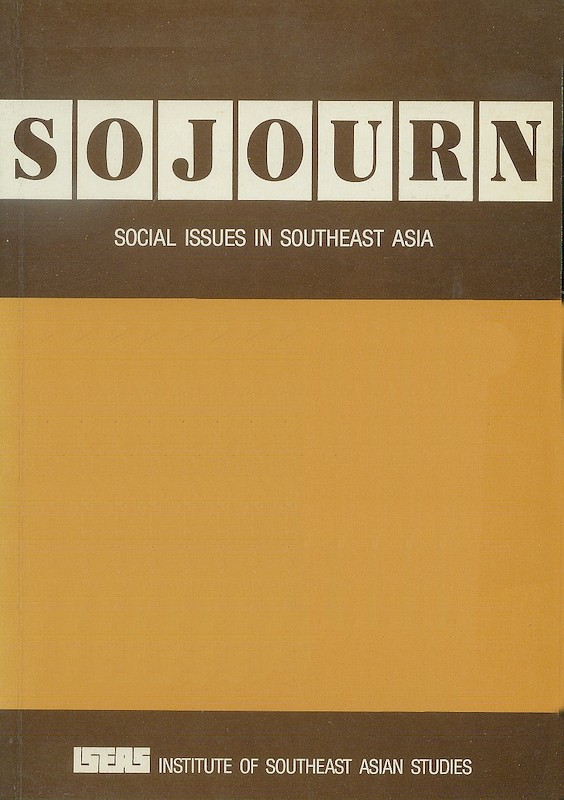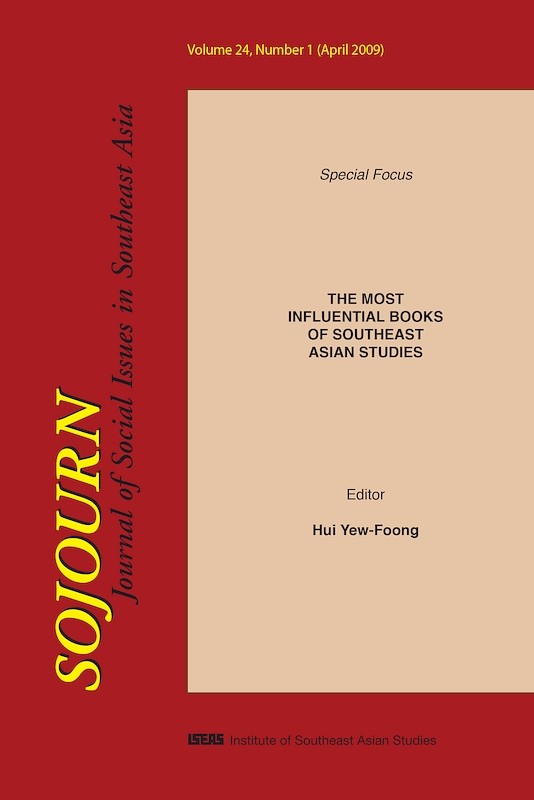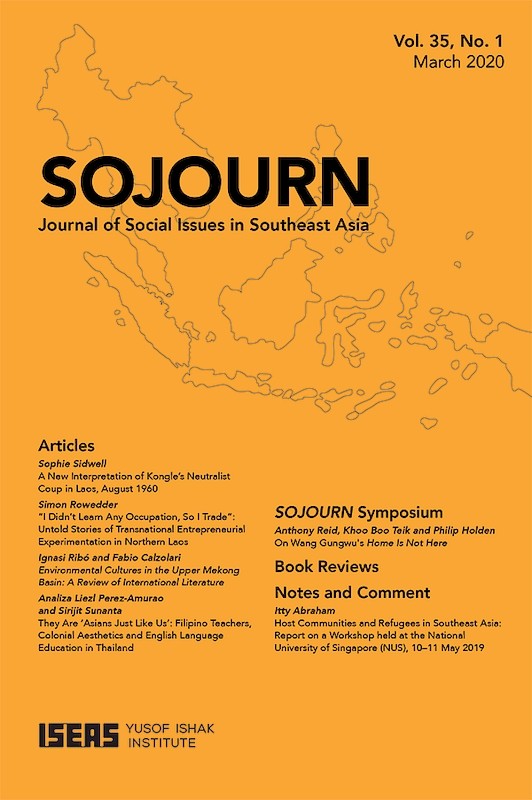SOJOURN: Journal of Social Issues in Southeast Asia Vol. 20/1 (April 2005)

Date of publication:
May 2005
Publisher:
Institute of Southeast Asian Studies
Number of pages:
118
Code:
SJ20/1
Contents
-
SOJOURN: Journal of Social Issues in Southeast Asia Vol. 20/1 (April 2005)
[Whole Publication] -
Preliminary pages
- ARTICLES
-
Sir Thomas Stamford Raffles Discourse on the Malay World: A Revisionist Perspective, by Khairudin Aljunied, author see abstractThis article provides a revisionist perspective of Southeast Asia's historical icon by examining in detail Sir Thomas Raffles discursive strategies that sought to justify the study and preservation of Hinduism and Buddhism in the Malay World. Foremost within such strategies was by way of portraying Hinduism and Buddhism as practised by the Malays as a binary opposite of Islam. Secondly, Raffles sought to demonstrate the affinities of Hinduism and Buddhism with European Traditions. Last but not least, he argued that the legacies of Hinduism and Buddhism in the Malay World were suffering from a climate of decline. Most importantly, the article demonstrates ways in which Raffles discourse is revealing of the influence of dominant methodologies and ideologies amongst Europeans during his milieu.
-
The Lao Economic Field, by Boike Rehbein, author see abstractWith globalization and the introduction of a market economy, profound changes are taking place in Lao society. The transformation is not confined to quantitative economic data, which have hitherto been the prime object of research on the Lao economy; it also affects social structure and cultures. The article argues that the transformation is understood best if analysed in social and cultural terms on the basis of Pierre Bourdieu's concept of social fields. Against this backdrop it becomes clear that the Lao economic field has its own social structure, which is not identical with the structure of other fields. Even though formally a market economy, the economic field is dominated neither by capitalist culture nor by entrepreneurs. Various groups with different cultures struggle for various positions on and definitions of the field. The article examines the groups and their cultures as well as the impact of globalization on them.
-
Singapore's Experience in Curbing Corruption and the Growth of the Underground Economy, by Sam Choon-Yin, author see abstractThis article suggests, firstly, that an extensive underground economy (UGE) is undesirable because it brings forth more harm than benefit to the economies and, secondly, that curbing corruption is a useful measure to contain the growth of the UGE. The key to curbing corruption is the enactment of appropriate rules as well as having in place good men men who are incorruptible to enact and enforce the rules. The article uses Singapore as a case study: Singapore has often been touted as one of the least corrupt countries in the world; the UGE also appears relatively inactive in the city-state. If there is some link between the two, it may be useful to emulate Singapore's experience in curbing corruption and consequently the growth of the UGE.
-
When Push Comes to Shove: Sites of Vulnerability, Personal Transformation, and Trafficked Women's Migration Decisions, by Sallie Yea, author see abstractDiscussions of the push and pull factors behind trafficked women's decisions to migrate abroad for tenuous work opportunities in the entertainment sector tend to variously privilege poverty, familial obligations, and, more recently, personal opportunism. This reinforces more general observations about motivations for Third World women who migrate to more developed regions globally. Although these factors are indeed important, the authors research has revealed the relevance of other explanations for migration decisions, including the prevalence of domestic violence, family dissolution, and escape from personal circumstances, which are themselves products of low self-esteem and sense of self-worth.
- BOOK REVIEWS
-
BOOK REVIEW: The Intimate Economies of Bangkok: Tomboys, Tycoons, and Avon Ladies in the Golden City. By Ara Wilson, by Suradech Chotiudompant, author
-
BOOK REVIEW: Two Is Enough. Family Planning in Indonesia under the New Order 19681998. Edited by Anke Niehof and Firman Lubis, by Brigitte Holzner, author
-
BOOK REVIEW: Minorities, Modernity, and the Emerging Nation: Christians in Indonesia. A Biographical Approach. By Gerry van Klinken, by Susan Rodgers, author
-
BOOK REVIEW: Social Science Research and Conservation Management in the Interior of Borneo: Unravelling Past and Present Interactions of People and Forests. Edited by C. Eghenter, B. Sellato, and G. Simon Devung, by Steve Rhee, author
-
BOOK REVIEW: The Collapse of a Colonial Society: The Dutch in Indonesia during the Second World War. By L. De Jong, by M.R. Fernando, author

